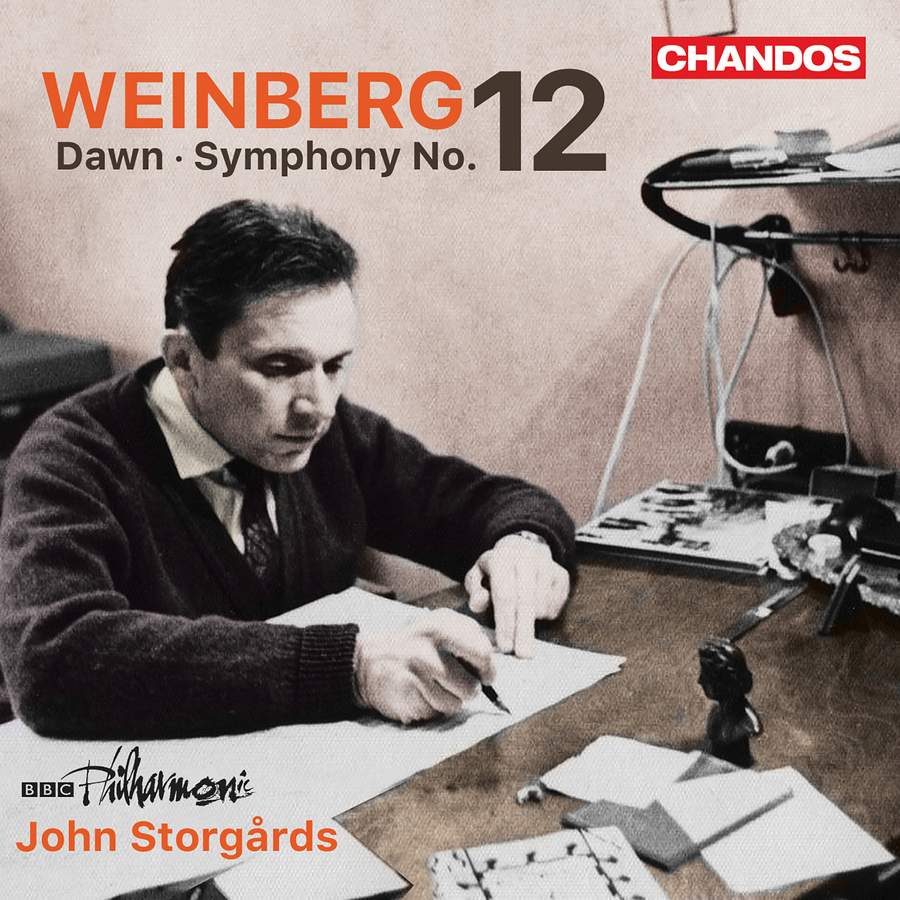WEINBERG Symphony No 12 (Storgårds)
View record and artist detailsRecord and Artist Details
Genre:
Orchestral
Label: Chandos
Magazine Review Date: 12/2023
Media Format: CD or Download
Media Runtime: 74
Mastering:
DDD
Catalogue Number: CHAN20165

Tracks:
| Composition | Artist Credit |
|---|---|
| Dawn |
Mieczyslaw Weinberg, Composer
BBC Philharmonic Orchestra John Storgårds, Conductor |
| Symphony No. 12, 'In memory of Shostakovich' |
Mieczyslaw Weinberg, Composer
BBC Philharmonic Orchestra John Storgårds, Conductor |
Author: Marina Frolova-Walker
Mieczysław Weinberg was a prolific composer, so even though many of his pieces have been revived over the past 30 years, we still lack a clear overview of his output. We can, though, place the music we know into two crude categories: those pieces that sound like Shostakovich and those that do not. On this disc we have pieces from both sides of this divide. Dawn, written for celebrations of the 40th anniversary of the Revolution (1957), sounds as if it could as easily belong to Shostakovich’s 1905. By contrast, Weinberg’s monumental Twelfth Symphony explores a strikingly original sound world, even though it is dedicated to the memory of Shostakovich. The disc is a welcome offshoot from the ongoing work on Shostakovich’s symphonies by John Storgårds and the BBC Philharmonic, and displays the same high level of stylistic discernment and emotional commitment.
Dawn seems to follow the usual course of Soviet pieces portraying the Revolution, emerging from capitalist darkness and struggle through to the bright light of socialism, but the last phase is strangely brief. Weinberg was playing his strong suits, of gloom and anxiety, and the piece is saturated with funereal and military march rhythms in evocative instrumental combinations. The BBC Philharmonic engage the listener from the outset, with the beautiful deep string sound of the opening bars, and we continue on a gripping sonic journey that strays far from the well-worn paths of socialist realism.
Weinberg’s Symphony No 12 is an hour‑long score from the late 1970s, an intimidating piece that unfortunately ended the composer’s long artistic relationship with the conductor Kirill Kondrashin, who demanded a rewrite (this and other fascinating facts are to be found in David Fanning’s excellent booklet notes). The symphony begins with powerful unison gestures that are neither harmonically nor rhythmically akin to Shostakovich. Instead, Weinberg seems to draw directly from some of Shostakovich’s influences. There is the near-atonal 1920s counterpoint of Hindemith and Krenek (to be heard in Shostakovich’s Symphony No 4 and some late works), together with hints of Mahler. The first movement, for example, ends with a kind of Mahlerian plea, but this is one of the few lyrical passages. The slow episodes are sparsely scored and ascetic, while elsewhere there is aggression and grotesquerie. Standing out from all of this is a naive marimba melody that refers to the Shostakovich song ‘Immortality’ from the Michelangelo Suite, but even this interacts with the gloomier material in some strikingly mysterious passages.
Weinberg’s fascinating tapestry of colours and textures forms a breathtaking ‘concerto for orchestra’ (as Fanning says) and this recording does it full justice. There are great solos, intense conversations between orchestral groups, pregnant pauses and enigmatic moments. How it all hangs together may be unclear on a first listening but the music compels the listener to repeat the experience.
Discover the world's largest classical music catalogue with Presto Music.

Gramophone Digital Club
- Digital Edition
- Digital Archive
- Reviews Database
- Full website access
From £8.75 / month
Subscribe
Gramophone Full Club
- Print Edition
- Digital Edition
- Digital Archive
- Reviews Database
- Full website access
From £11.00 / month
Subscribe
If you are a library, university or other organisation that would be interested in an institutional subscription to Gramophone please click here for further information.




